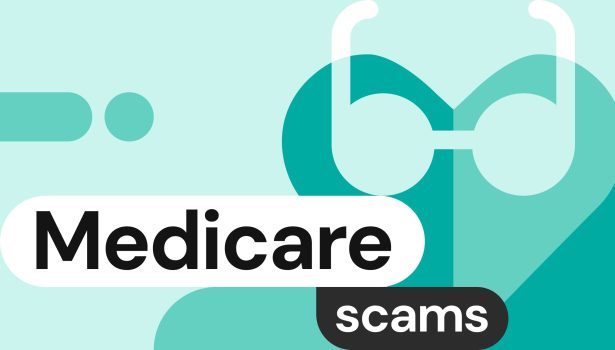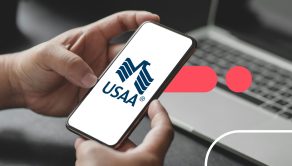Medicare scams: how to recognize and avoid them

Medicare scams are widely common and unfortunately target some of the most vulnerable populations—seniors and people with disabilities. This is a type of insurance fraud in which fraudsters trick unsuspecting victims into sharing their personal information and Medicare numbers for identity theft and fraudulent medical claims.
Their deceptive tactics often include impersonation and highly convincing scenarios, such as offering free medical services or Medicare card replacements. To make matters worse, many people eligible for Medicare may not be digitally savvy or aware of social engineering tricks and therefore become easier targets.
This guide explains Medicare scams and provides go-to best practices for spotting and stopping scammers who are after your Medicare number.
What are Medicare scams?
Each year, Medicare is estimated to lose $60 billion to fraud and abuse, defined as intentionally providing information that is known to be false for the purpose of obtaining financial or other benefits. A big part of this is Medicare scammers stealing benefits and requesting medical supplies and services that legitimate beneficiaries never receive.
Scammers can reach out by phone, email, postal mail, text message, or even in person. In some cases, these schemes grow to enormous proportions, such as the nationwide genetic testing fraud that resulted in over $2 billion in losses and legal charges against 35 individuals.
Medicare scammers typically operate in the following ways, and it pays to recognize such scams to protect your Medicare benefits and, ultimately, your identity.
Medicare representative or doctor impersonation
This is the largest category of Medicare scams, involving a range of scenarios that lead to the theft of victims’ personal information, such as Medicare numbers, Social Security numbers, and credit card data.
Scammers don’t even have to be from the medical field. They can simply impersonate generic Medicare representatives, medical staff like doctors, or health plan brokers using social engineering techniques.
Across these scenarios, scammers invent the following reasons to get you to share your Medicare number and other personally identifiable information:
- Updating your patient records
- Booking a medical appointment or lab test
- Claiming you need a mandatory telehealth check-in
- Informing that you’ve been preapproved for free medical equipment delivery
- Requesting a new Medicare card (see below)
- Warning you that your Medicare plan may be canceled due to nonpayment of premiums
- Offering a “better” or “cheaper” Medicare plan, or additional drug and service coverage
- Telling you that you’re eligible for a refund on certain medical services, equipment, or prescriptions
- Claiming you overpaid for medical services and are now owed a rebate
- Checking in to confirm a suspicious claim
- Notifying you of your Medicare account data breach
To carry out these scams, scammers will typically request your personal information, including Medicare number and Social Security number, to “enroll” you in a medical service or program, “verify” your eligibility or “confirm” your identity. In some specific cases, they will also demand immediate payment, threatening Medicare coverage cancellation unless you comply.
Remember, no legitimate Medicare official will contact you unprompted, as they only respond to contact requests initiated by Medicare beneficiaries themselves. If someone claims to be your healthcare provider, it’s best to hang up and verify the information using the provider’s official communication channel.
Medicare card renewal or upgrade scam
Medicare did release new, more secure cards in April 2018, removing SSNs from them. This prompted scammers to launch fraudulent card renewal schemes at the time.
Even now in 2025, scammers still target unaware Medicare beneficiaries with claims that they’re eligible for or need to reissue an upgraded Medicare card with a chip or new color codes.
To process this “card replacement,” they will need your Medicare number to verify your identity and complete the upgrade. To further nudge you, they may claim that your Medicare coverage will be cancelled unless you agree to reissue your card.
Remember that, as of 2025, there are no Medicare card reissues planned. Legit Medicare cards also don’t contain chips. Never share your Medicare number with strangers or allow them to fill out any forms in your name. When in doubt, verify any new information in your online Medicare account or by calling 1-800-MEDICARE (1-800-633-4227).
Free medical supplies or services
Among the many Medicare scams going around, this is perhaps the easiest to fall for, as scammers offer free medical supplies and services allegedly covered by Medicare. These offers can include free genetic tests, braces, orthotics, testing kits, and the like.
In reality, scammers’ intention is to get your Medicare number so they can bill Medicare for expensive products and services that the legitimate beneficiary doesn’t even need and will never receive. Even if you do receive the product, it will likely be something cheap and unusable, as the scammer’s main goal is to exploit your Medicare benefits on behalf of someone else.
COVID-19 scams
The COVID-19 pandemic has been part of our lives for so long that it’s still used as a convincing premise to target people in Medicare scams.
Victims can be approached over the phone or even in person, with offers of free coronavirus testing kits, lab tests, telehealth or vaccines. Scammers may also offer to conduct a COVID-19 survey in exchange for money or a gift, or sell you a fake vaccination card. In all of these cases, they use these offers to ask for your Medicare number and subsequently misuse it to steal your benefits.
Be wary of any unsolicited offers of supplies and services related to COVID-19, and only order related products or services through your trusted doctor or health care provider. Remember that legitimate COVID-related services are initiated through your health care provider, not by cold calling, texting or door-to-door visits.
Inaccurate charges or excessive services
In this type of Medicare scam, fraud comes from providers of medical services and supplies who abuse the program by billing Medicare for products and services they never deliver or provide to people who don’t need them.
This may include:
- Telehealth fraud, where victims are signed up for unnecessary telehealth appointments with doctors they don’t know.
- Medicare billing fraud, such as upcoding of services to charge more than the cost of the actual service, or phantom billing for services that were never delivered.
- Durable medical equipment fraud, which involves billing Medicare for items such as wheelchairs and braces that patients don’t need or never receive.
- Remote patient monitoring fraud, where Medicare is billed for remote physiologic monitoring that the beneficiary didn’t sign up for, didn’t need, or never received.
This scam can take many forms. Consult these Medicare fraud fact sheets from the Senior Medicare Patrol Resource Center for a more detailed overview of common schemes and how to protect yourself and your loved ones.
What can a scammer do with your Medicare number?
Once scammers get hold of someone’s Medicare number, they can abuse it by stealing the person’s identity and benefitting from it financially in the following ways:
- Filing false Medicare claims and obtaining prescriptions or medical services.
- Selling Medicare numbers to criminals on the dark web.
As a result, victims of Medicare scams may suffer financial and legal consequences that can take months and thousands of dollars to resolve:
- If your benefit limits are used up, Medicare may deny your coverage for legitimate treatments.
- Incorrect medical records may affect your future care, as they get tainted with fraudulent billing or include misleading information unrelated to your actual health condition.
- You may be held accountable for co-pays and deductibles from fraudulent services.
- If suspected of fraud, your Medicare coverage may be cancelled.
- In rare cases, you may face scrutiny if your Medicare account is linked to multiple suspicious claims.
Since personal Medicare numbers are gateways to healthcare benefits, obtaining them deceitfully via unsolicited calls or other forms of contact is considered fraud. Treat your Medicare number as your credit card and Social Security number—it’s just as sensitive, and perhaps even more valuable to scammers.
Red flags and how to identify a Medicare scam
The best way to prevent Medicare scam risks is to educate yourself and learn to recognize red flags. When approached by a scammer, you must only rely on your judgement and awareness to avoid falling victim to their tactics.
These are common Medicare scam red flags:
- Unsolicited calls, emails, texts, or home visits that you didn’t request.
- Offers of free services, equipment, or lab tests, such as genetic testing.
- Pressure to switch to a new Medicare plan, sometimes for a fee.
- Requests to renew or update your Medicare card.
- Threats to cancel your benefits unless you provide sensitive information or make a payment.
- Requests for you to sign a blank form.
- High-pressure tactics demanding immediate action or payment.
Watch out for common scam phrases such as:
- “We need your Medicare number.”
- “You will lose your Medicare benefits if you don’t do this.”
- “You’re eligible for free (equipment, service, etc.)”
- “There’s a suspicious claim (or activity) on your Medicare account.”
- “You’re eligible for a refund.”
Real Medicare officials never employ urgency or scare tactics. They never call to sell anything or visit people at home. Their communication will always be solicited, following you up after you join a plan, report fraud, or leave a message requesting a contact from Medicare.
What to do if you gave your Medicare number to a scammer
If you gave your Medicare number to a stranger—over the phone, online, at an event, or in response to an advertisement—take these immediate steps:
- Report it to Medicare immediately by calling 1-800-MEDICARE (1-800-633-4227).
- You can also submit your fraud report online to the U.S. Department of Health and Human Services or call their Office of Inspector General hotline at 1-800-HHS-TIPS (800-447-8477).
- If you suspect your identity details have been stolen and someone is impersonating you to get Medicare benefits in your name, report identity theft to IdentityTheft.gov.
- If you’re unsure about what happened, contact your local Senior Medicare Patrol for empathic, knowledgeable assistance in identifying and reporting potential fraud.
In the aftermath of the scam, while your fraud report is being processed:
- Request a new Medicare card when reporting your case to Medicare or through your online Medicare account. If fraud is suspected, Medicare may replace your card. Your old card will be then invalidated, preventing further misuse, but scammers may still have access to other sensitive data such as your SSN.
- Monitor your Medicare Summary Notices and Explanations of Benefits for unfamiliar services or equipment, and report anything suspicious.
- If you gave away your credit card data along with the Medicare number, place a fraud alert with your bank or credit card issuer.
- Sign up for an identity protection service that monitors for fraud and may include restoration and reimbursement support in case of identity theft, while also automatically monitoring your credit, home and car titles, and detecting data breaches to protect you from potential financial and reputational harm.
How to protect yourself from Medicare scams
Follow these steps to protect yourself from Medicare scams and, by extension, medical identity theft:
Be mindful of personal information sharing
The rule of thumb is that you should never share your medical and financial information with people you don’t know, or whose identity you can’t reliably verify.
You should never give anyone your Medicare number, Social Security number or Social Security card except to people you know and trust, such as:
- Your doctor
- Insurers acting on your behalf
- Licensed agents and brokers of your insurance and health plan provider
- People working for your local State Health Insurance Assistance Program (SHIP). You can look up their legitimate contacts here.
Remember that solicited Medicare communication is always initiated by you. Anyone who contacts you without your permission and claims they’re with Medicare or your medical institution are likely to be impersonators. Even if the caller ID looks like it’s from Medicare, know that scammers can spoof phone numbers to appear legitimate and make their schemes more convincing.
Learn how to request a new Medicare card legitimately
You should receive your Medicare card by mail in your welcome package after signing up for Medicare. Another way to get it is to print it via your secure online Medicare account. See the instructions here.
Legitimate reasons to replace your Medicare card include it being lost, stolen, or your name changing. In either case, card replacement should be initiated by you through your Medicare account, by phone or following the instructions from Social Security.
Know that no new Medicare card issues are planned in 2025, so any unsolicited offer to replace or upgrade it is fake.
Educate yourself about Medicare communication policies
As a government program, Medicare is highly regulated in how its officials and representatives should interact with program beneficiaries. It means you can look up these policies in publicly available sources. You can also demand explanations as to how your personal information is used, what parties it is shared with, get a copy of the information held about you, and request the limiting of its use.
- Review the Notice of Privacy Practices for Original Medicare to educate yourself about the ways Medicare uses and shares your personal information.
- Learn what health plans representatives can and cannot do when communicating with you.
- Talk to your local Senior Medicare Patrol to learn how to protect yourself from Medicare scams, fraud, and errors, detect such instances in time, and report your concerns if they arise.
Review your Medicare Summary Notices and Explanation of Benefits
Fraudsters thrive on people’s lack of awareness. To catch Medicare abuse and fraud early, regularly review your Medicare Summary Notices and Explanation of Benefits (EOB) to verify if everything stated corresponds with the services, procedures and equipment you received.
Watch out for unexpected medical bills and insurance claims, benefit limit notifications, medical debt you don’t recognize, or incorrect medical records. If you spot anything unfamiliar or see double charges, report the issue to Medicare and your local Senior Medicare Patrol.
Reduce your digital footprint
Many scammers find their targets using publicly available information, such as on people-search and data broker websites. Often it’s enough just to know someone’s name, phone number and home address to unleash a fraudulent attack.
Onerep works to remove your personal information from 200+ websites to minimize your digital footprint and safeguard your privacy, keeping your personal details out of reach from malicious actors. The service reduces your visibility online while monitoring for your data reappearance on these sites to prevent your identity theft before it happens.
Start a free scan to check where your personal data is exposed now.
FAQs
Are there Medicare scams going around?
Yes, there are many Medicare scams and fraud schemes going around, with some of the most prominent ones involving offering free services such as genetic tests, claiming the beneficiary needs a new Medicare card to continue using the program, and excessive or incorrect billing for services, drugs, and equipment that patients don’t need or never receive.
Is Medicare issuing new cards?
As of 2025, Medicare is not issuing new cards. The last time there was an update to the Medicare card was in 2018. Never share your Medicare number in any unsolicited calls, emails or texts offering you a Medicare card upgrade or reissue. When in doubt, contact Medicare at 1-800-MEDICARE (1-800-633-4227).
Should I give my Medicare number over the phone?
No, you should never provide your Medicare number, Social Security number, and other personal information to anyone calling you out of the blue. Be cautious and only provide this information in solicited conversations initiated by you, such as when speaking to a trusted source (your doctor, health plan provider, or SHIP representative).
Does Medicare ever call beneficiaries?
Medicare does not contact beneficiaries directly unless this contact is first initiated by the beneficiary. It means that any unsolicited communication is likely to be from impersonators, not legitimate Medicare representatives. Never share your Medicare number and other PII with people you don’t know.
Can someone steal my identity with my Medicare number?
Yes, your identity can be stolen if you provide your Medicare number to a scammer. In combination with your full name, home address, and date of birth, this information is often enough to fraudulently claim Medicare benefits using your identity.





Dimitri is a tech entrepreneur and founder of Onerep, the first fully automated data removal service. Top cybersecurity CEO of 2021 by The Software Report.